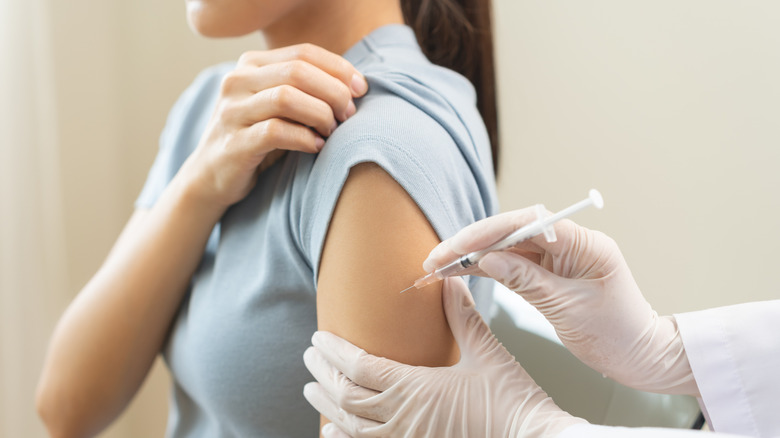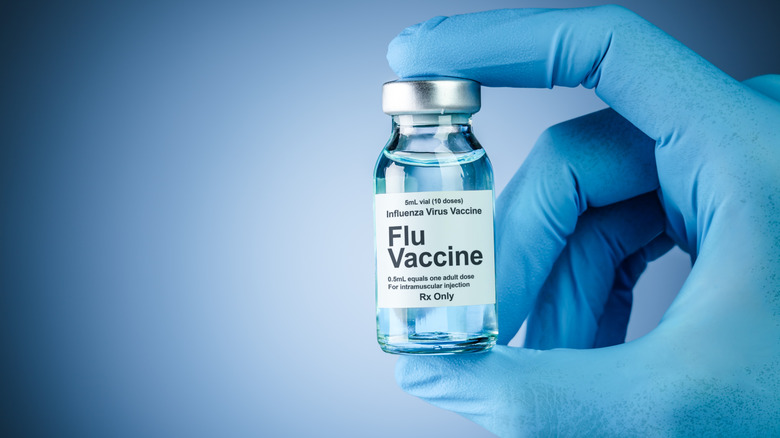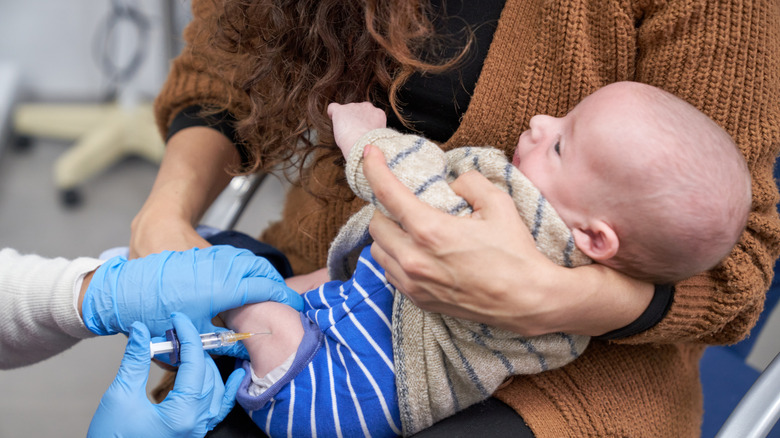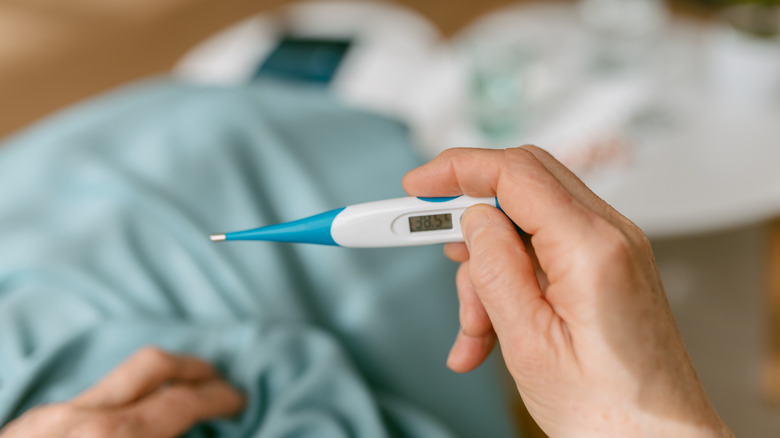The Traveler's Guide To Vaccines, From Must-Have Shots To Smart Health Hacks
If the COVID-19 pandemic taught us anything, it is that there is now more scope for cross-contamination across nations than at any other point in human history. In addition, the West Nile virus turned up on American shores at the turn of the 21st century. After years of retreat, the dreaded tuberculosis is making a comeback now. Decades after its virtual eradication, polio is on the march again as well. Measles is having something of a renaissance, and the perils of climate change are allowing pathogens to encroach fresh territories.
For the most part, the risk of contracting such illnesses is vanishingly small, thanks in no small part to robust childhood vaccination projects by the Center for Disease Control (CDC) protecting the vast majority of the population. Travel, however, adds a whole new dimension to the proceedings. Americans are not routinely vaccinated for yellow fever, cholera, tick-borne encephalitis, or any number of diseases not commonly found across the continental United States.
And for the most part, that's fine. You don't need a jab in order to experience a quick stay at any of Paris' most luxurious hotels. There are some vaccines recommended (but not required) to enter Australian territory, and British water is as cholera-free as anything you'd find stateside. That said, other countries can have higher risks of infections. Routine vaccinations are a must for most of us, but other, itinerary-specific immunizations may have to be considered and, in some cases, are required. It's a complicated issue and for some, a controversial one. What you'll find listed below is advice pulled from official sources in an attempt to create an unvarnished narrative based solely on what the science has to say on the matter.
How vaccines work
In medicine, the goal is to first find the cure and figure out why it works afterwards. The British Navy used lime juice to ward off scurvy centuries before scientists discovered the existence of specific vitamins. During the 11th century, doctors in China took swabs of pus from the smallpox patients and deliberately infected healthy individuals with them. Some patients developed full-on smallpox. Most, however, experienced mild symptoms — thanks to the low virus yield they had been exposed to — and gained lifelong protection in return.
The first "true" vaccination didn't arrive until 1796 (via the National Library of Medicine), when Gloucestershire-born Edward Jenner learned that dairymaids never suffered from smallpox. Their apparent immunity was all thanks to their inevitable brush with cowpox, a less virulent disease and a naturally occurring occupational hazard. The realization that one disease provided protection against the other, led to an inevitable conclusion: A deliberate inoculation of cowpox could prevent anyone from ever contracting its more virulent cousin.
Over time, the reason Jenner's technique worked was revealed as the science of vaccination progressed. According to the CDC, the vaccine's role is simply to emulate an infection and, in doing so, cause an immune response. The material responsible for causing said response is known as an antigen. Antigens do not cause disease to develop. Instead, they stimulate the body's immune system, causing it to create the antibodies needed to stave off a brush with the real infection. In some cases, the protection wears off, and regular boosters are needed. In others, the vaccine does not always prevent infection, but if such a thing occurs, the disease is generally milder and rarely fatal. And, sadly, some viruses and pathogens are too mercurial for vaccines to work with any great efficiency: Flu jabs are necessarily annual, and the cold is simply something we must endure.
The importance of routine vaccinations
The first thing you need to consider when traveling a trip overseas is your current vaccination status. Most of us received our vaccinations as children, with the aim of protecting us against a wide range of preventable illnesses. In total, there are seven recommended vaccines known as the "combined seven." Per the CDC, the full list includes the MMR vaccine, which protects against measles, mumps, and rubella, and the DTP, used to combat diphtheria, tetanus, and pertussis. Other courses of immunization are designed to ward off singular infections, including haemophilus influenzae type B jab alongside chickenpox, hepatitis B, and the pneumococcal conjugate vaccine. Lastly, the polio vaccine — which is no longer administered orally in the U.S. but may have been given to you that way back in the day — is given to almost all children. The virtual eradication of polio stands as a testament to the success of this program.
Some vaccines may require boosters prior to travel. The CDC recommends you get your tetanus booster every 10 years or so. Adventurous people bent on traveling the world's longest defined coastal routes might want to consider getting it before getting their hands are too caked in dirt. In a similar vein, there are certain countries where specific diseases are more common; your doctor may suggest a Hepatitis A and/or B booster when traveling to such regions.
Lastly, there is the seasonal flu jab. Influenza can seriously ruin a holiday, and again, the CDC recommends that you get yourself protected from it before traveling overseas. Remember, flu season in the Southern Hemisphere occurs at different times to the one in the north, usually between April and September.
Mandatory vaccines in certain destinations
Routine vaccines remain available to most people on a purely voluntary basis. Coverage is extensive, although not universal, and does vary from state to state. Still, certain countries require specific vaccinations before allowing entry. In other cases, it is returning from a country without proof of immunization that is something of a no-no. In such eventualities, you're going to need a certificate of vaccination, or you will be denied entry.
The principal diseases in question here are polio and yellow fever. For the former, things are straightforward enough. According to the World Health Organization (WHO), wild polio is currently only found in Afghanistan and Pakistan. Anyone returning from those countries after a stay of four weeks or longer must show proof of vaccination before returning to their country of origin. The CDC's list of nations requiring yellow fever vaccinations is much longer, and in some cases, anyone arriving from a high-risk location may to provide proof of their vaccination status. Indeed, simply traveling through those areas for any significant period of time is enough reason for officials to demand said evidence. You may be okay if it's just a layover at the airport hotel but it's best to check over your itinerary to ensure if even that is permissible.
In cases where vaccinations are mandatory, anyone who objects to having them administered should consider a different destination for their getaway. Certain niche vaccines also exist and are often also non-negotiable, such as the one designed to prevent the spread of ebola. These, however, are neither recommended nor required by the CDC for casual travelers and are instead issued to high-risk personnel tasked with combating the disease in question.
When to get vaccinated
There are whole lists of what to do when planning a vacation, beginning with figuring out what travel insurance is and whether you need it, and ending with the logistics of the inevitable airport dash. In some cases, the decisions are made months in advance — researching the best beaches in the world takes time, after all. Other choices are more immediate like last-minute online purchases for necessary items to bring along in your suitcase. Vaccines fall somewhere in the middle.
There are several things you're going to need to prepare for. The first is finding out where to get a vaccine, so you can schedule a date in your calendar when you can speak with your healthcare provider. As a rule of thumb, the National Health Service (NHS) says your appointment should be some six to eight weeks prior to your departure date. Similarly, the CDC recommends within four to six weeks. In a perfect world, vaccinations would confer instantaneous, near-mythical protection from whatever pathogen or virus you are trying to avoid. In reality, your body needs time to develop antibodies, and that means that there is often a lag, sometimes a considerable one.
A typhoid vaccination needs a month for maximum effectiveness, for example (via NHS). You'll be safe enough from hepatitis A after 14 days, but it could take as much as six months to achieve full immunity. Such figures are, of course, averages; some people produce antibodies at a slower rate than others, something that tends to slow down as we age. In cases where vaccination is mandatory, you will need to bring documentation that demonstrates not only that you have been vaccinated, but also that enough time has passed for it to have taken hold.
Where to get vaccinated
It has often been said that simply being near a body of water is good for you. Little surprise then that the scientific definition of "blue health" underlies many of our vacationing choices whether we are aware of it or not. Still, the fact remains that there are times when protecting our sense of well-being is a little bit more involved than finding a quiet beach to sit upon. On such occasions, knowing when to get vaccinated is one thing but knowing where to go is perhaps of more immediate concern.
Two pieces of information are essential for such exploration. Firstly, you need a record of your vaccination history. Secondly, you need to know what vaccines — if any — are required for your journey, including any boosters you might need. Conveniently, your healthcare provider should be able to provide you with answers to both questions.
Meanwhile, most vaccines can be obtained at your local pharmacy, which is generally a more cost-effective option, and a quick search on the internet should help you find a place nearby. Others require a visit to the doctor, and some of the less common immunizations may entail a visit to a specialized travel medicine clinic. The CDC's Find a Clinic page can help you locate one of those as well.
Dealing with side effects
No matter how routine a vaccination has become, the act of introducing a foreign element into your system can influence its equilibrium. For the most part, you should anticipate some kind of reaction: It's part of the normal immune system response. Of course, not all vaccines are born equal and some cause more robust reactions than others.
To begin with, there is always the possibility of an allergic reaction. Symptoms can include fatigue, a rash, dizzy spells, swelling of limbs, or nausea, according to the CDC. At worst, a recipient can go into anaphylactic shock, but such a reaction is not only rare, it is also easily treated. Hang around for 15 minutes or so to ensure nothing untoward has occurred is generally considered good practice.
Outside of allergic response, symptoms are generally mild. You are liable to have a sore arm for a while and perhaps some irritation at the site of the injection. Most modern vaccines contain killed fragments of the organisms responsible for the disease and cannot infect you with the full-blown illness (via WHO). Still, live vaccines such as yellow fever and the MMR injection can cause flu-like symptoms some three to 10 days after administration. It's one more reason to plan your vaccinations well in advance of that once-in-a-lifetime vacation destination. Regardless, if you become unwell after a vaccination, you should contact your health care provider immediately. Lastly, there are two types of typhoid vaccine: one injected and one taken orally. The second variety has been known to cause bowel discomfort and nausea for a couple of days after taking it. Still, typhoid itself is a very nasty, potentially fatal disease, and the recommendation is that the brief mild discomfort you may experience via immunization is preferable to an actual brush with it in the wild.
Prepping for a vaccination
Since most people experience only the mildest of symptoms post-vaccination, you won't find them to be too much in the way of your regular schedule. If you begin to feel ill after your yellow fever shot, you can deal with symptoms in the usual way via rest, fluids, and over-the-counter medications. Still, there's no harm in minimizing the risk of any complications, and there are things that can be done to avoid them.
To start with, ensure you are both well-rested and adequately hydrated. You can also eat a healthy, balanced meal prior to getting an injection; whole foods with a reputation for anti-inflammatory properties are a good idea, as is increasing your fruit and vegetable intake. Wear loose, comfortable clothing while on your way to get vaccinated. Fidgeting and having to undress prior to the jab can cause unwanted anxiety and muscle strains around the injection site that you can probably do without.
You should also avoid taking NSAID medication such as ibuprofen or aspirin prior to vaccination, as they may affect your ability to produce antibodies and thus weaken your response to the vaccine, according to the National Library of Medicine. Meanwhile, if you have access to one, a cold compress placed on the affected area can help reduce swelling. Around 24 hours after the injection, if you still feel some discomfort, a warm compress can help alleviate the aches. Other than that, you should simply take it easy both before and after the procedure. Mild activity is fine, but heading out for a hiking route that is less than beginner-friendly the day before your jab or indeed immediately after it is probably not the best idea.
How to avoid exposure regardless of vaccination status
Few of us would disregard experts when they caution of hidden dangers in exotic locales. There are long lists of things you should never do in a rainforest, people wax lyrical when it comes to avoiding Australia's most dangerous wildlife, and bloggers warn of petty theft hotspots throughout the world. In short, avoiding threats is half the travel battle.
Vaccines may be modern miracles, but they have their limits. Some grant near-universal protection, often for life, without the need for a booster. Others are less effective and aim only to decrease the severity of any potential infection. None have ever reached 100% efficacy, according to the WHO. A newly-inoculated traveler needn't overly concern themselves with thoughts of impending disaster, true, but hubris has a way of rearing its ugly head when we least expect it. So it's best to prepare for the worst and hope for the best.
Avoiding areas with health advisory warnings is a good place to start. Color-coded warnings range from levels one to four, with four being a do-not-travel caution that you absolutely need to heed. Level three suggests you reconsider your plans, while level two merely advises that you practice enhanced precautions. Making sure your vaccines are up to date falls into this category. Next up is the need to avoid what are known in epidemiology as vectors. A vector-borne disease is one that is carried from one organism to another. Obvious examples include mosquitoes infecting humans with malaria or yellow fever, ticks carrying Lyme disease, and tsetse flies acting as a vector for sleeping sickness. Appropriate clothing, the use of high-quality insect repellent, and an informed understanding of water hygiene practices — including knowing where not to swim — helps form a welcome, extra layer of protection.
What to do if you get sick anyway
Up-to-date vaccines and avoiding vector-borne illnesses via a routine of hand washing and refusal of ice in drinks are all well and good, but what if you get sick anyway? Well, hopefully you have a travel insurance policy that covers you if you get sick abroad. If your vaccines are up to date, chances are you are going to have a mild illness, although you might still want or need a consultation with a health care provider. If the illness is severe, however, you're going to want insurance robust enough to either help you get home or else offer equivalent-level care at your destination.
Identifying the illness is paramount. Flu-like symptoms are just a description of what it feels like when your body begins to fight an infection. As the disease progresses, other signs of illness may become apparent, such as the constipation you get with typhoid fever or the lesions associated with chickenpox. Regardless, if you think you have contracted something more serious than a cold, you need to get tested. With vector-borne illnesses, you may not be infectious to others — although if they are on the same itinerary as you, they might also have been similarly exposed. In other cases, you probably can cross-infect, so if possible, isolate yourself from others.
A diagnosis is important here. You need to know whether the condition is life-threatening or not, or if it is something that you can ride out, given the appropriate medication. You also need to establish a time frame. You can, for example, recover from yellow fever in as little as three days, given appropriate medical care. Post-infection, you might be able to continue your vacation as if nothing had happened, depending on what you contracted.
Methodology
Most of the information obtained for this article was via meticulous research taken from official sources such as the Center for Disease Control (CDC) and the World Health Organization (WHO). Mandatory vaccine lists were, for example, obtained from the National Travel Health Network Centre. The advice was correct at the time of writing. Still, you should double-check with your healthcare advisor before planning a trip to anywhere that requires or recommends vaccination and discuss possible side effects alongside pros and cons with them before taking the jab.










